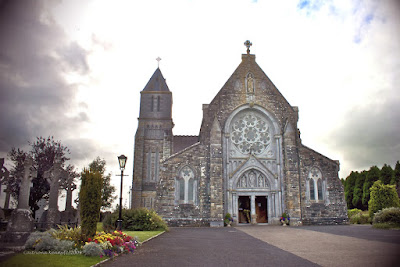Today in the Orthodox Church, the twelfth of September, we commemorate another very early Irish missionary bishop who also preached in Wales: Saint Ailbe of Emly. A contemporary, friend and fellow-worker in the vineyard of Saint Padrig, Saint Ailbe is also intimately associated with the patron saints of Wales, Non and her son Dewi.
Saint Ailbe [also Ailbhe, in Welsh Eilfyw, in Latin Albeus and in English Elvis] was said to have been the illegitimate child of a thrall in the household of the Irish prince of Munster. Much like Œdipus in Greek lore, the unwanted Ailbe was left exposed on the slope of a hillside on the prince’s orders – and like the founders of the city of Rome, he was found by a she-wolf who cared for him, protected him and nursed him in his infancy. Later, when the she-wolf who nursed him was fleeing from hunters, she fled into his church and rested her head on his lap; and thereafter he protected her and her cubs, and allowed them to eat from his stores of bread. Although this accords with the common theme among Celtic saints that they were close to nature and often befriended wild animals, these are very likely later interpolations and hagiographical flourishes, though we may accept it as read that Saint Ailbe was of mean birth.
When he was yet a youth he encountered and was baptised by British missionaries who were then serving in Ireland – one of these may have been Saint Palladius. He studied under them, and they, impressed by Ailbe’s quick mind and ease with which he took in knowledge, ordained him a priest. He thereafter made a pilgrimage to Rome, where he was consecrated a bishop. He made his way back to Ireland to find Saint Padrig there evangelising the Irish people. Saint Ailbe had no objections whatever to the presence of this British bishop, and indeed became Padrig’s obedient disciple. Padrig placed him in authority over Emly in Munster, though this diocæse was soon relocated to Cashel.
Saint Ailbe was a vigorous and energetic missionary, both preaching the word of truth in a language that ordinary people could understand, and working wonders by the power of his prayers delivered in a spirit of true humility. He lived in accordance with the commandments of God, prayed and fasted and gave openly to all who asked of him. By means of his preaching and teaching under Christ’s and Saint Padrig’s authority, he not only brought multitudes of Irish in the southwest of the island to Christ, but also by his own example of life inspired them to the pursuit of virtue. It is said that he made of ordinary heathen not only Christians but saints.
Ailbe was given the isles of Aran in Galway by Óengus mac Nad Froích, which in turn sound as the foundation of the monastery of Saint Éanna. Ailbe also set out a strictly ascetic rule for monks which was followed on Aran for many generations afterward. His own ascetic discipline included constant inward prayer, an early model in the West for the hesychasm and prayers of the heart which would come to be common in the East.
Saint Ailbe did not stay his whole life in Emly; like many Celtic missionaries, he was itinerant for much of his career. He ventured into the home country of his spiritual father, and was active in Dyfed. In Wales he is known as Eilfyw Sant, and he was taken by Bishop Rhygyfarch to have been the missionary hierarch who baptised Saint David. If this is true, then he would likely also have been the preacher who was silenced in the presence of Saint Non, and who prophesied the greatness of the unborn baby she carried in her womb. He returned to Ireland to continue his work in Emly, though at the end of his life he took a desire to visit the island of Thule far to the north. The king of Munster, in order to prevent his flight, stationed guards at every port and had them watch for the saint. And so Saint Ailbe reposed in the Lord in Munster as he was going about his duties as bishop.
Today in Emly there exists a holy well and a stone cross dedicated to Saint Ailbe, both of which are still there and are still visited by pilgrims. There is also a parish dedicated to St Elvis in Dyfed, and of course Saint Eilfyw is associated with the baptism of Dewi Sant and thus with the holy wells that still exist in Dyfed dedicated to Dewi and his mother Saint Non. Saint Ailbe is therefore an important saint both in Wales and in Ireland. Holy father Ailbe, blessed bishop and tutor of monastics, pray unto Christ our God that our souls may be saved!
When Ireland’s Enlightener returned to his native land,
He found thee, O holy Ailbe, preaching the Faith at Emly,
Where at the bidding of an angel thou hadst built a church.
O wise shepherd of souls and glorious ascetic,
O friend of animals, and fellow missionary with the illustrious Padrig,
Pray to Christ our God that we might also become bastions of Orthodoxy
And a shining example to our fellow countrymen,
Drawing them away from ignorance and error
And into the true Faith that all our souls may be saved.













No comments:
Post a Comment